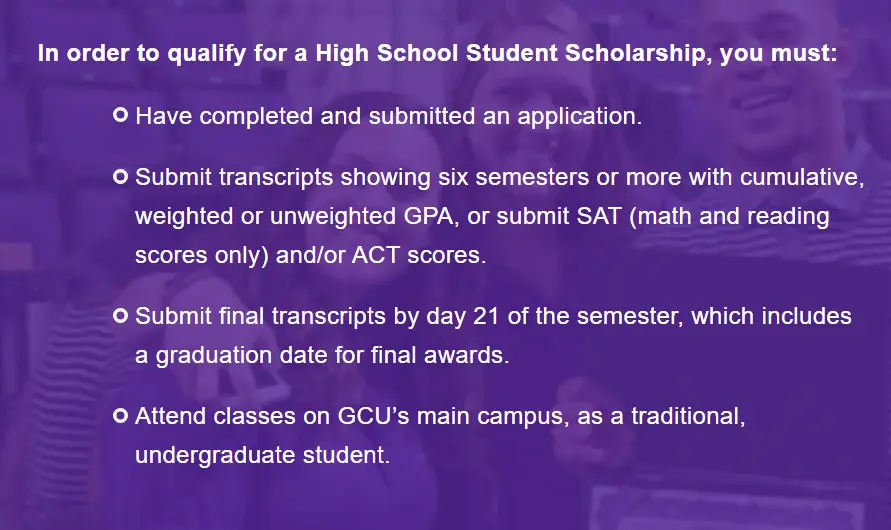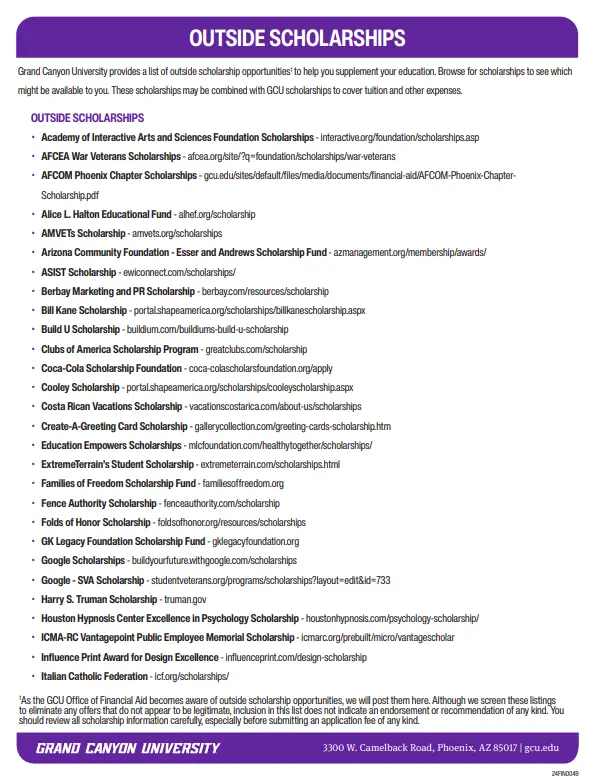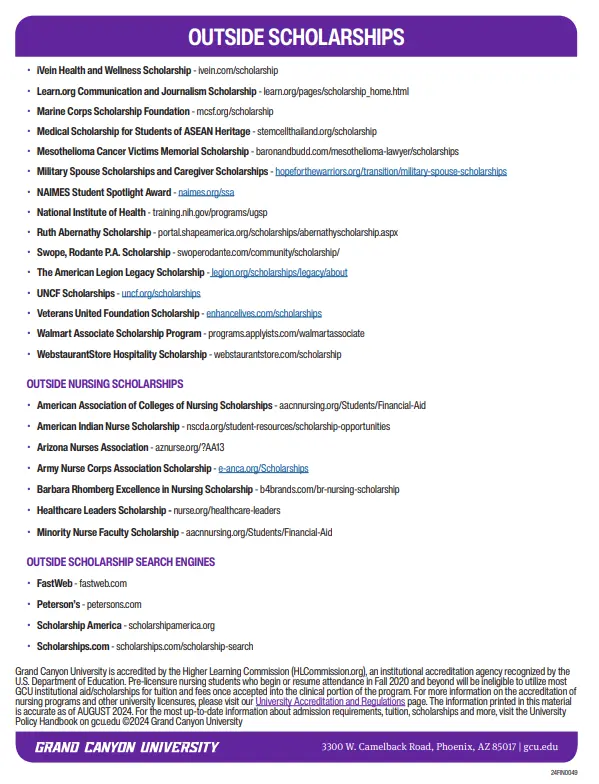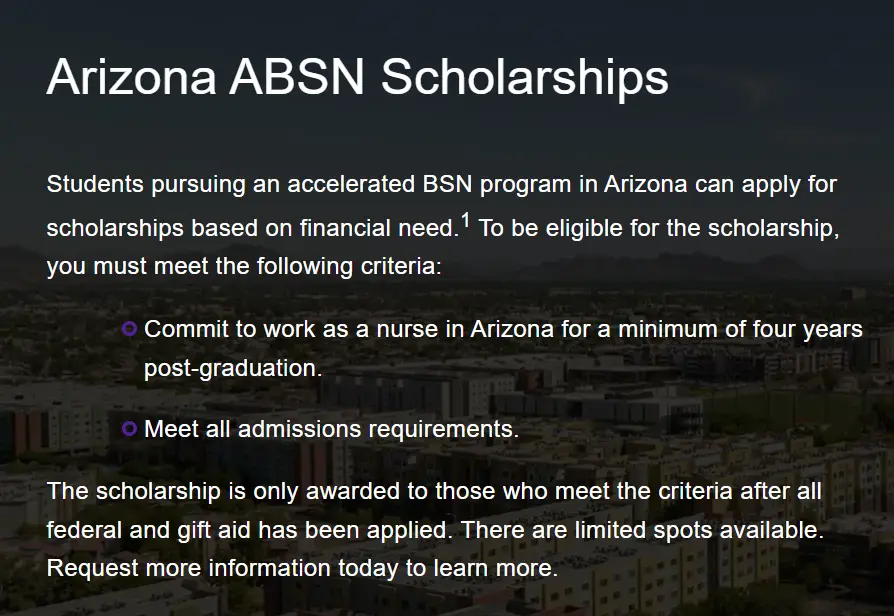GCU Scholarships For Students 2025
GCU scholarships help make college more affordable, giving students financial support for tuition and other education-related expenses. Many students worry about covering the cost of their degree, but Grand Canyon University has a broad range of scholarships that can help lighten the load.
GCU scholarships are available for all kinds of students—new freshmen, transfers, online learners, and grad students. Each one comes with its own eligibility rules and steps, so students can look for options that fit their background and goals.
If you’re considering GCU, exploring these scholarships can reduce your out-of-pocket costs and help you borrow less. Knowing what’s out there and how to apply is honestly pretty important for anyone thinking about Grand Canyon University.

Overview of GCU Scholarships
Grand Canyon University (GCU), a private Christian university, offers a variety of scholarships to help lower tuition and support students as they work toward their degrees. Scholarship programs at GCU address needs like merit, financial need, and special affiliations.
Understanding Scholarship Programs
Grand Canyon university scholarships aim to make education at this private Christian university more accessible. Each program has its own eligibility requirements, like GPA, test scores, or community involvement. Most need-based awards require students to complete the Free Application for Federal Student Aid (FAFSA).
Students have to meet GCU’s deadlines and provide the right documents. Both new and returning students should apply for as many scholarships as possible each year. Some scholarships can be renewed if students keep up their grades or meet other requirements.
Types of Scholarships Available
GCU has a pretty wide range of scholarships for different backgrounds and achievements. The main categories include:
- Merit-Based Scholarships: For academic achievement, test scores, or leadership.
- Need-Based Scholarships: For students with significant financial need, usually requiring the FAFSA.
- Transfer Scholarships: For students coming in from other colleges.
- Military and Affiliation Scholarships: For active-duty military, veterans, and their immediate families.
- Program-Specific Scholarships: For students in certain majors or academic programs.
- Outside Scholarships: Outside scholarships for GCU students.


GCU updates its scholarships pretty regularly, so it’s smart to check with the financial aid office or the university website for the latest details. Some awards can be combined to increase your total support.
Eligibility Criteria and Application Process
GCU offers a bunch of scholarships for both incoming and current students. Each one has its own rules, deadlines, and documentation needs.
General Eligibility Requirements
GCU scholarships are open to full-time undergrad and grad students who meet academic, financial, and university criteria. Eligibility usually depends on GPA, test scores, major, and class standing. High school seniors need to be admitted to GCU before they can apply.
Many scholarships are need-based, so students have to show financial need by filling out the FAFSA. International students can apply for some institutional scholarships, though not all are open to non-U.S. citizens.
To keep their awards, current students need to stay in good academic standing. Some scholarships also require students to join campus activities or stick with certain degree programs.
Application Steps
Usually, the application process starts after a student gets admitted to GCU. Students use the GCU scholarship portal to fill out a general application with personal, academic, and financial info.
Some scholarships ask for extra documents, like essays, recommendation letters, or résumés. It’s important to read each award’s requirements before applying.
After submitting, GCU reviews applications based on eligibility and merit. Sometimes, applicants get contacted for interviews or more info. Award notifications usually come by email.
Important Deadlines
Meeting deadlines is huge if you want to be considered. GCU sets annual deadlines for most scholarships. For high school seniors, deadlines often fall between December and March.
- Priority Deadlines: Apply by these dates for the best shot.
- Final Deadlines: Miss these and your application might not get reviewed.
- FAFSA Submission: Fill this out as soon as it opens in the fall.
Deadlines can vary by program and award. Always check the GCU financial aid website for the latest info.


FAFSA and Financial Documentation
Most GCU scholarships require the FAFSA. This form helps figure out what federal, state, and university aid you can get based on financial need. Students should complete the FAFSA online and use GCU’s school code.
Other financial documents might be needed—tax returns, W-2s, or proof of independent status. International students aren’t eligible for federal aid but might need to submit other forms for GCU scholarships.
Getting your financial paperwork in on time really matters. Delays can mean less funding or missing out on some scholarships altogether.
Academic and Program-Specific Scholarships
GCU has scholarships that focus on academic achievement and support students in certain fields. These awards recognize merit, area of study, and dedication in areas like nursing or business.
Merit-Based Scholarships
GCU gives merit-based scholarships to students who stand out academically. Eligibility usually comes down to GPA, test scores, and class rank. For instance, the President’s Scholarship can offer higher awards to first-year students with a GPA above 3.5 and solid SAT or ACT scores.
Selection is competitive, with an edge for those who show leadership. Some merit scholarships automatically consider you when you apply to GCU, while others need a separate application or interview. Certain merit awards aim to boost campus diversity and may prioritize students of color.
Here’s a quick table with the main details:
| Scholarship Name | Eligibility Criteria | Typical Amount |
|---|---|---|
| President’s Scholarship | 3.5+ GPA, test scores | Up to $7,500/year |
| Dean’s Scholarship | 3.0–3.49 GPA | Up to $5,000/year |
| Provost’s Scholarship | Leadership, academics | Variable |
Nursing Scholarships
GCU knows there’s a real need for skilled nurses, so they offer scholarships for nursing majors. These usually look at GPA, financial need, and a commitment to healthcare. The Future Nurses Scholarship is a popular choice for students entering the Bachelor of Science in Nursing (BSN) program.
Other scholarships may be available if you’re going for an advanced nursing degree or working with certain partner hospitals. Clinical experience, service projects, and minority status can all help your chances. You’ll need to keep your grades up to hang onto most nursing scholarships.
Nursing students should check with GCU’s College of Nursing and Health Care Professions for a complete list of opportunities and requirements.
Business Student Scholarships
Business majors at GCU can apply for scholarships focused on leadership, entrepreneurship, and academic performance. The Colangelo College of Business has awards for undergrads in accounting, finance, management, and marketing.
Eligibility often involves a certain GPA, involvement in business clubs, or internships. Some scholarships especially value entrepreneurial drive or community service. There are also diversity scholarships for students of color and first-generation college students in business.
Requirements and deadlines can change, so it’s smart to check the college’s website now and then for updates.
Financial Aid, Tuition, and Costs
GCU students pay different tuition rates depending on their program, learning format, and residency. Financial aid includes everything from full-tuition scholarships to tuition reduction programs.
Understanding Tuition and Fees
GCU sets tuition and fees each year, and they can vary a lot between undergrad, grad, and doctoral programs. On-campus undergrads pay per semester, while online students pay per credit hour. Some classes, labs, and materials come with extra fees.
Here’s a quick breakdown:
| Student Type | Tuition Format | Approximate Rate |
|---|---|---|
| On-Campus Undergrad | Per Semester | $8,250/semester (2024-25) |
| Online Undergraduate | Per Credit Hour | $515/credit (2024-25) |
| Graduate Online | Per Credit Hour | $590 & up/credit (2024-25) |
Mandatory fees might cover student services and technology. Housing, meal plans, and books aren’t included in tuition.
Full-Tuition Scholarships
GCU offers a few full-tuition scholarships for students who really stand out academically, in leadership, or in talent. Applicants need a strong GPA, high test scores, and usually have to participate in GCU’s scholarship competitions.
These scholarships don’t usually cover extras like housing or meal plans. They can be renewable if you keep up your grades and stay full-time. Since competition is tough, make sure you hit all the deadlines.
Tuition Fee Reduction Programs
Tuition reduction at GCU comes through need-based grants, merit scholarships, and discounts for employer partners. Some programs focus on transfer students, military members, or alumni coming back for grad school.
GCU also takes federal Pell Grants, state grants, and outside scholarships as part of your aid package. Payment plans and loans can help with what’s left. It’s a good idea to complete the FAFSA and talk to a financial counselor to get the most aid possible.
Values, Accreditation, and Student Experience
Grand Canyon University (GCU) holds accreditation, stands by its core values, and supports a wide community of students from all backgrounds. The university’s Christian foundation shapes its approach to education and campus life.
Accredited Programs at GCU
GCU is a regionally accredited private Christian university in the Southwest. The Higher Learning Commission (HLC) provides regional accreditation, which means GCU meets certain standards for academic quality and integrity.
Lots of GCU’s programs are accredited by professional groups. For instance, their nursing programs have accreditation from the Commission on Collegiate Nursing Education (CCNE), and their business degrees are accredited by the Accreditation Council for Business Schools and Programs (ACBSP).
These accreditations help ensure GCU’s degrees are recognized by employers and other schools. Students can feel pretty confident that their education meets industry standards.
Institutional Values and Mission
GCU’s mission is rooted in Christian values, aiming to create an academic environment built on faith. The university focuses on fostering leadership, service, and ethical decision-making.
Core values like integrity, compassion, and lifelong learning shape campus policies and student support. Faculty and staff blend faith and learning in the classroom and campus life, building a culture where academic rigor and values go hand in hand.
Support for Diverse Communities
GCU works hard to support students of color and underrepresented groups. Around 40% of students at GCU identify as students of color, according to recent data.
Support includes mentorship, cultural organizations, and resource centers to help students feel welcome. The university also hosts regular events celebrating different cultures and perspectives.
GCU offers scholarships to increase access for students from all backgrounds. These efforts are part of GCU’s broader goal to make higher education more inclusive, all within its Christian mission.
Frequently Asked Questions
Grand Canyon University (GCU) has scholarships and financial aid for prospective, current, international, transfer, and online students. Each scholarship has its own requirements for GPA, academic merit, and student status.
